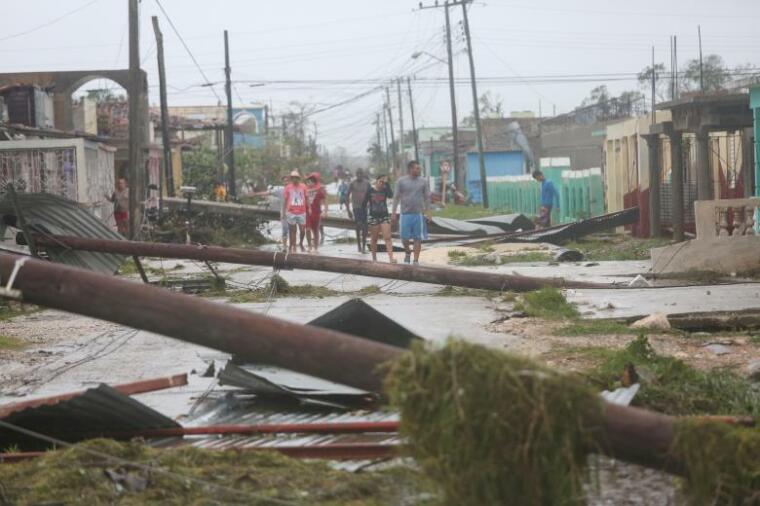Cuban government is blocking religious charities from aiding Hurricane Irma victims, pastor warns

A Cuban pastor has warned that the communist government is blocking the efforts of religious charities to provide humanitarian aid to the victims of Hurricane Irma.
Pastor Mario Félix Lleonart Barroso, a Cuban missionary and human rights activist, has stated that the "Cuban regime has not responded adequately" to the devastation caused by Hurricane Irma, the first Category 5 hurricane to hit the island in over 80 years.
A report released by the Cuban government in late September indicated that 158,554 homes were affected by the storm, 14,657 of which were destroyed and 16,646 partially destroyed. While other Caribbean islands affected by hurricanes were able to receive aid from international charities, Cubans have limited access to humanitarian aid following disasters due to the barriers put in place by the government.
Barroso, who has been arrested numerous times for his opposition to the government, told The Christian Post in an email that the government is trying to blocking religious and secular aid organizations from providing relief to the hurricane victims.
"Attempts by churches to help Cuban citizens are viewed with suspicion by the authorities. The regime always tries to subtract the prestige and influences of the churches among the population. From Cuba, I have been warned of threats and even arrests against believers who have only wanted to help," he said.
The pastor noted that he has heard of instances when the government confiscated humanitarian aid from groups like "Pastores por el cambio."
"In relation to Hurricane Irma, we met two missionaries who belong to the group called 'Caminos de Victorias.' They were detained for a whole day and then released," he recounted.
Barroso asserted that most of the humanitarian funding Cuba receives is being spent on tourist facilities owned by the government.
He said that despite the pressure from the government, "churches persist in helping."
"Outside the government, [organizations are] not allowed to help, either from the ecclesial or secular realm. However, both churches and secular organizations try to help as they can, even if problems are sought," the pastor said.
Barroso drew widespread attention last year after he was arrested just before U.S. President Barack Obama landed in Cuba for a three-day visit in March 2016. He said that he was locked up in a "dungeon" and was mistreated before he was released on March 22.
His arrest in 2016 was just one of about 20 times he was apprehended by the authorities for his opposition to the communist regime since his first arrest in February 2011.
Barroso and his family have been living in the U.S. since Aug. 18, 2016 after they were accepted as refugees by the U.S. government.
The pastor has since written a book, titled "Cubano Confesante," to chronicle his experiences in Cuba between 2010 and 2016.
He is planning to share his testimony of persecution at the fourth annual Night of Prayer for the Persecuted Church on Nov. 18 at Chinese Community Church in Washington, D.C., where he will be joined by other persecuted Christians from North Korea, Pakistan and Iran.
 Christians don't have to affirm transgenderism, but they can’t express that view at work: tribunal
Christians don't have to affirm transgenderism, but they can’t express that view at work: tribunal Archaeology discovery: Medieval Christian prayer beads found on Holy Island
Archaeology discovery: Medieval Christian prayer beads found on Holy Island Presbyterian Church in America votes to leave National Association of Evangelicals
Presbyterian Church in America votes to leave National Association of Evangelicals Over 50 killed in 'vile and satanic' attack at Nigerian church on Pentecost Sunday
Over 50 killed in 'vile and satanic' attack at Nigerian church on Pentecost Sunday Ukrainian Orthodox Church severs ties with Moscow over Patriarch Kirill's support for Putin's war
Ukrainian Orthodox Church severs ties with Moscow over Patriarch Kirill's support for Putin's war Islamic State kills 20 Nigerian Christians as revenge for US airstrike
Islamic State kills 20 Nigerian Christians as revenge for US airstrike Man who served 33 years in prison for murder leads inmates to Christ
Man who served 33 years in prison for murder leads inmates to Christ


 Nigerian student beaten to death, body burned over ‘blasphemous’ WhatsApp message
Nigerian student beaten to death, body burned over ‘blasphemous’ WhatsApp message 'A new low': World reacts after Hong Kong arrests 90-year-old Cardinal Joseph Zen
'A new low': World reacts after Hong Kong arrests 90-year-old Cardinal Joseph Zen Iran sentences Christian man to 10 years in prison for hosting house church worship gathering
Iran sentences Christian man to 10 years in prison for hosting house church worship gathering French Guyana: Pastor shot dead, church set on fire after meeting delegation of Evangelicals
French Guyana: Pastor shot dead, church set on fire after meeting delegation of Evangelicals ‘Talking Jesus’ report finds only 6% of UK adults identify as practicing Christians
‘Talking Jesus’ report finds only 6% of UK adults identify as practicing Christians Mission Eurasia ministry center blown up in Ukraine, hundreds of Bibles destroyed: 'God will provide'
Mission Eurasia ministry center blown up in Ukraine, hundreds of Bibles destroyed: 'God will provide' Church holds service for first time after ISIS desecrated it 8 years ago
Church holds service for first time after ISIS desecrated it 8 years ago Burger King apologizes for 'offensive campaign' using Jesus' words at the Last Supper
Burger King apologizes for 'offensive campaign' using Jesus' words at the Last Supper Uganda: Muslims abduct teacher, burn him inside mosque for praying in Christ’s name
Uganda: Muslims abduct teacher, burn him inside mosque for praying in Christ’s name